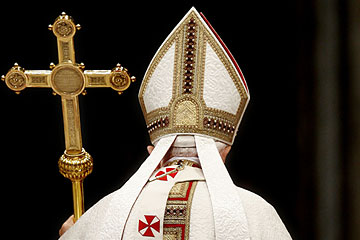From the Los Angeles Times, more details are emerging about Pope Benedict’s health:
Peter Seewald, a German journalist who has interviewed Benedict on numerous occasions, said that when he last saw the pope 10 weeks ago, his hearing had deteriorated and he appeared to have gone blind in his left eye.
“His body had become so thin that the tailors had difficulty in keeping up with newly fitted clothes. … I’d never seen him so exhausted-looking, so worn down,” he told Focus, a German magazine, on Saturday.
Seewald quoted the pope as saying: “I’m an old man and the strength is ebbing. I think what I’ve done is enough.” Asked if he was considering retiring, Benedict replied, “That depends on how much my physical strength will force me to that.”
And the New York Times has some interesting perspectives on papal infallibility and the historic new era we’re entering:
Although its origins go back centuries, the notion of papal infallibility was effectively codified at the First Vatican Council, a meeting of church officials in the 1860s. At a time when other European monarchies were ceding more power to the mechanisms of representative democracy, papal infallibility became a kind of consolation prize for the Vatican losing its temporal powers.
In fact, the invocation of papal infallibility “ex cathedra” has only occurred twice in the modern era: In 1854, when Pope Pius IX promulgated the doctrine of the Immaculate Conception, that Mary was without original sin. And in 1950, Pope Pius XII pronounced the doctrine of the Assumption of the Virgin, that Mary had been assumed into heaven, body and spirit. The church has not ruled on whether the Virgin Mary died before she was assumed into heaven.
“If after March 1, Benedict XVI loses his head and writes that he declares in an infallible way that the Virgin Mary died before being assumed into heaven, this won’t be an infallible decision, because he’s no longer doing it as pastor of the universal church,” said Philip Goyret, a professor of ecclesiology at the Rome’s Santa Croce University, a private Catholic university run by Opus Dei. “It will be his personal opinion.”
“But he’s a very intelligent person and will never do that,” Mr. Goyret added.
Although the Vatican has tried to play down concerns, experts and prelates worry what it will mean to have two popes alive at the same time, and both living inside the Vatican.
“It’s completely uncharted waters,” said Andrea Tornielli, a Vatican expert for the Turin daily La Stampa and Vatican Insider. “They say they’re calm about it, but it’s not easy to say what the role of the new pope will be. Will the new pope be able to create new decisions that go against those of Benedict? It’s a question.” Others say that if he were to leave the Vatican, having the former pope in a different city might lead to more confusion, if the faithful perceived him to preside in a different center of power, and made pilgrimages to see him.
Assuming Benedict stays at the Vatican, as has been announced, “I can imagine these unhappy Catholics going to the old pope and saying, ‘What do you think about that?’ ” Mr. Pennington said. “I think that this would raise serious issues of where authority and where infallibility and where the truth in the church lies.”
The Vatican has acknowledged some of the confusion. “For many it’s still a surprise,” Father Lombardi, the Vatican spokesman, said last week. “There’s a lot of reflection on the significance of the decision and what this implies for the church and for the Roman Curia.”












